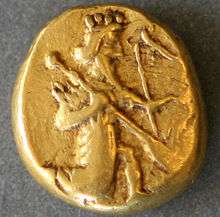daric
English

A daric
Etymology
From Ancient Greek δαρεικός (dareikós), from an Old Persian word related to 𐎭𐎼𐎴𐎡𐎹 (daraniya-, “gold”), from *𐎭𐎼𐎡 (dari-, “golden”) (compare Avestan 𐬰𐬀𐬌𐬭𐬌 (zairi-, “yellowish, golden”)), ultimately from Proto-Indo-European *ǵʰelh₃- (“gleam, yellow”). Compare Aramaic דריכונא (drykwnʾ), Classical Syriac ܕܪܝܟܘܢܐ (drykwnʾ), Biblical Hebrew אֲדַרְכּוֹן (adarkon) and Parthian 𐫅𐫀𐫡𐫏𐫃 (dʾryg /dārīg/, “gold coin, Dareikos”).
Considered by classical authors to be from Δαρεῖος (Dareîos, “Darius”) who standardized the coinage as such, but this is a folk etymology.
Noun
daric (plural darics)
- A gold coin from Persian Empire, introduced by Darius the Great (522-486 BC) and used until Alexander the Great's invasion (330 BC).
Translations
gold coin from Persia
See also
References
- Michael Alram (December 15, 1994), "Daric", Encyclopædia Iranica
This article is issued from
Wiktionary.
The text is licensed under Creative
Commons - Attribution - Sharealike.
Additional terms may apply for the media files.